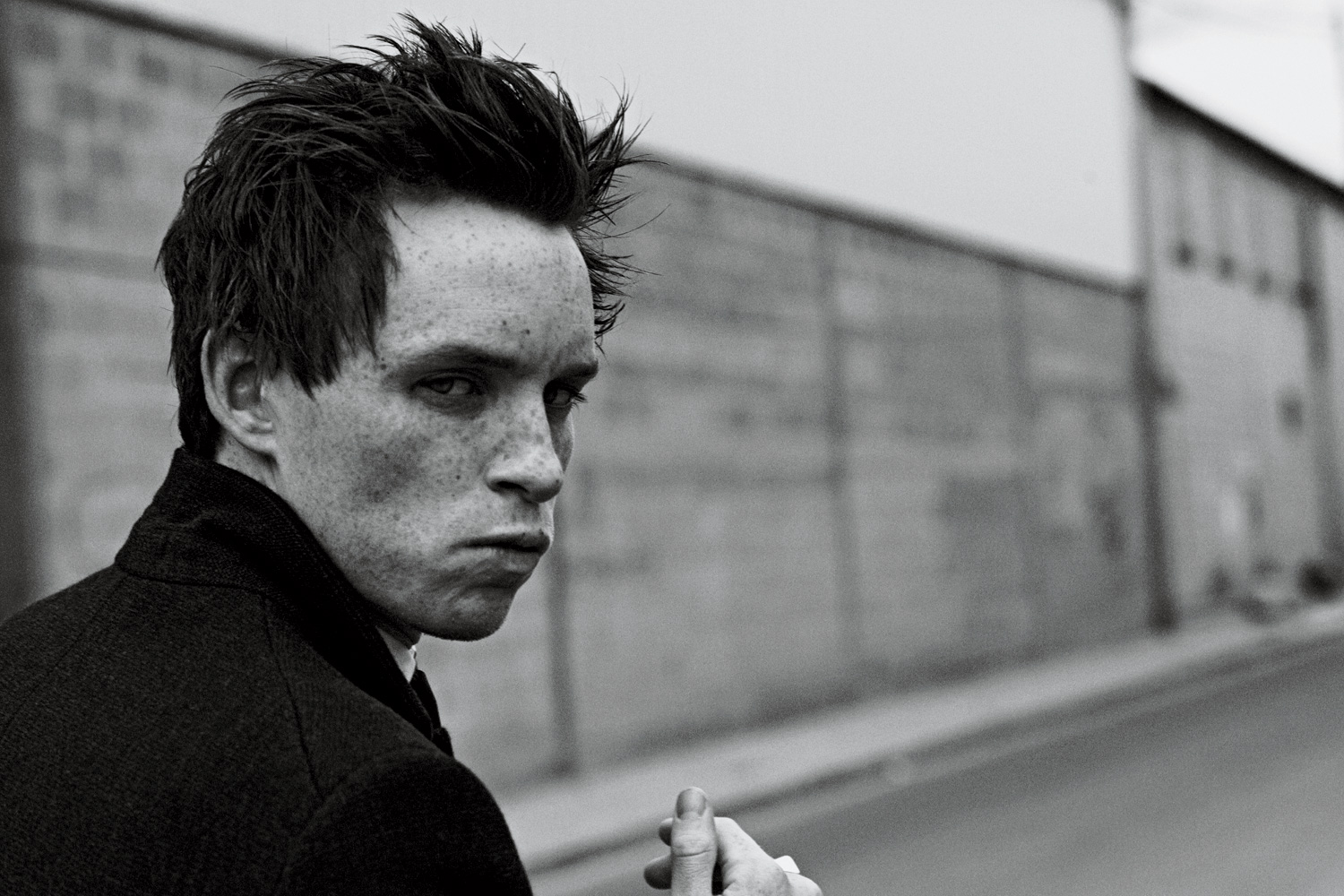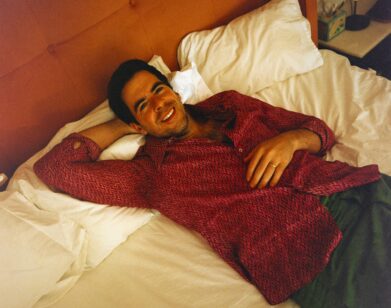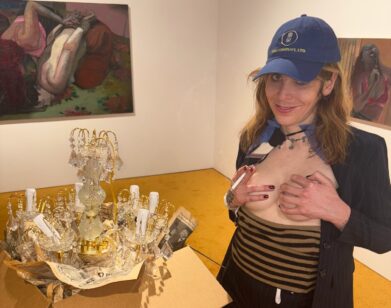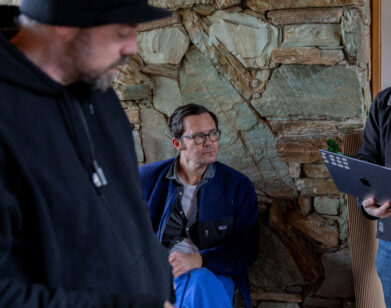Eddie Redmayne
IN ENGLAND WE have THIS SAYING about MARMITE: PEOPLE either LOVE IT or HATE IT. THAT’S like A LOT OF the MOVIE work I’VE DONE. PEOPLE either FIND IT REPULSIVE or FIND IT really INTERESTING and GET ENGAGED IN IT.Eddie Redmayne
Take one look at the ginger-haired actor Eddie Redmayne and this thought comes to mind: he’s right out of central casting for lovely British period dramas in the Merchant Ivory tradition. And certainly, the 29-year-old Londoner can act his way through any time period, as he makes clear in Simon Curtis’s new film My Week With Marilyn, which will be released this fall. Based on the memoirs of Colin Clark, the film stars Redmayne as a smart young gofer working on the Pinewood Studios set of The Prince and the Showgirl in 1956, during which time he has an odd, brief romance of sorts with a manic-depressive Marilyn Monroe (played with plenty of peroxide by Michelle Williams). But while Redmayne steals the movie out from under his costars—including Kenneth Branagh doing his best Laurence Olivier—and has proved his period mettle in several other projects, he is also an actor of impressive range that extends far beyond the physical and psychological territory of stiff British masterpieces. Look no further than his haunting performance on the Broadway stage in last year’s art hit Red, for which he won a Tony for his performance as Mark Rothko’s assistant, or his pitch-perfect disaffected American brat as Julianne Moore’s son and lover in the twisted 2007 drama Savage Grace. As the cherry on top, Redmayne has that skill often lacking in Americans and actors alike: the ability to hold his own in a conversation. This one took place by phone from New York to Budapest, where Redmayne was filming his next not-quite-so-ordinary project.
DAVID COLMAN: How’s Budapest?
EDDIE REDMAYNE: I spent the day in the trenches. We’re filming a World War I miniseries, and, to be honest, I haven’t seen much of Budapest. It’s been head-down working, so I’m hoping to get a weekend at some point soon and have a proper scout.
COLMAN: How long have you been there?
REDMAYNE: About three weeks. We’re shooting an adaptation called Birdsong, from a British book by Sebastian Faulks. It’s a beautiful love story set in France—the guy goes out to fight in World War I and comes back to Amiens and finds it completely different. It’s the first time I’ve played a soldier, so we get to have guns and bayonets and things like that.
COLMAN: But you had some practice—you know, killing Julianne Moore like you did in Savage Grace.
REDMAYNE: I did have some practice killing Julianne, that’s true.
COLMAN: You’ve done a lot of period films, haven’t you?
REDMAYNE: Yeah! I feel like I’ve worked my way through the Medieval period into the Elizabethan period, and now having done My Week With Marilyn along with Savage Grace, I’ve done the ’50s and ’60s. I was just on a film in North Carolina, and it was set in the ’80s. I’m sort of, step-by-step, working my way into the modern day.
COLMAN: Is there another time you could see yourself living in?
REDMAYNE: I kind of loved doing the Marilyn stuff set in the ’50s. One of the great experiences was shooting in Pinewood Studios. Michelle Williams was in Marilyn Monroe’s dressing room, and we were shooting in the studio where The Prince and the Showgirl was shot. In the studios next door, you had [the production of the fourth] Pirates of the Caribbean, and you wandered down this long corridor, and you would literally see a dismembered pirate come out of one door and some turn-of-the-century French something-or-other come out of another. There was an eclectic romance in shooting there. It also really reminded me of the romance of working in this industry, where you meet all these people and become very close very quickly, and then you all spin away again three months later. That makes for some intoxicating friendships. None of my family works in this world, and they always question that side of it. I always try to describe making movies like summer camp, or some holiday where you spend all day, every day with a new group of people whom you kind of love and then never see again.
COLMAN: You were living in New York when you did the play Red on Broadway. How was that?
REDMAYNE: I’ve got to say, I had the most spectacular time of my life. I was living in the East Village in a great little flat by Astor Place, and I’d always had this romantic dream about living in New York at some point. When I was living in New York, I had this slightly wannabe bohemian existence and took up painting, at which I’m appalling. I also bought several guitars.
COLMAN: Wow, the whole nine yards.
REDMAYNE: I figured if I was going to live the clicheÌ, I should probably live it all the way.
COLMAN: Did you start smoking hash?
REDMAYNE: No. It doesn’t work for me. But I did end up trying to fly back to London with an absurd number of guitars.
COLMAN: You live in London now, right?
REDMAYNE: I live just near the River Thames, down by the South Bank. But I haven’t been there much. I’ve been living out of suitcases.
COLMAN: How do you do that, living out of a suitcase?
REDMAYNE: When I go to these new places, I leave with crap that I didn’t arrive with, and I’ve actually invested in a load of bags that fall apart about five minutes after you use them. So I’ve ended up with that incredibly depressing scenario where you’ve landed at Heathrow and your bag comes out with that clear film wrapped around it.
COLMAN: Like Saran Wrap?
REDMAYNE: It’s happened at least twice, and I always feel like it’s a metaphor for my state of mind at the end of a job. It’s this battered, barely-put-together thing.
COLMAN: So how did you come to this Marilyn Monroe project?
REDMAYNE: Originally, when the script came in, I read the book and I was fascinated by this character Colin Clark. He’d grown up surrounded by people like Vivien Leigh and Laurence Olivier and Margot Fonteyn, who were friends of his parents, but he wasn’t intimidated by their fame. He went on to become a runner in the film industry. The film industry is incredibly hierarchical, a bit like Eton [College], which is where Clark went to school—and also where I went to school. But as a runner on a film set, despite the fact that you’re the lowest of the low, you also have access to everything, so what was challenging for me was that the guy is kind of an observer and a cipher.
COLMAN: Were you a Marilyn Monroe fan going in?
REDMAYNE: I have to put my hand up here. I’m getting better, but I remain one of the most ill-educated filmgoers in the world, so it was a wonderful excuse to watch a lot of Marilyn Monroe movies. What’s amazing is this whole movie is about how she was going through this incredibly desperate, dark time, and was a nightmare from all accounts—and yet when you watch The Prince and the Showgirl, she has this lightness and frivolity and this kind of sexy effortlessness.
COLMAN: She does that sort of effervescent quality—especially in Some Like It Hot [1959], The Seven Year Itch [1955], and Gentlemen Prefer Blondes [1953]. She was such a brilliant comedian. It’s interesting in this movie to watch her go to such lengths to be seen as serious—you know, having Paula Strasberg there on set the whole time. And it’s not that she’s a bad actress, but everyone just sort of wants her to do that thing that’s so amazing.
REDMAYNE: I know. “Do that thing!” “Be sexy!”—it’s such a damning moment when Olivier says that to her. It can be a miserable profession, acting, because you always want what you can’t have.
COLMAN: I just watched Savage Grace last night. You were amazing.
REDMAYNE: That was a really special project for me, which I chased and chased and chased, and finally got, thanks to Tom Kalin, the director, and to Julianne. It’s one of those scripts that you read and you become sort of embarrassingly protective of it, like, “Please don’t let anyone else get this!”
COLMAN: I can see why—it’s such an amazing role.
REDMAYNE: It is, but it’s also the kind I love. In England we have this saying about Marmite: people either love it or hate it. That’s like a lot of the movie work I’ve done. People either find it repulsive or find it really interesting and get engaged in it.
COLMAN: Incest tends to do that sort of thing. Either you love it or you don’t.
REDMAYNE: And now, in this film Hick I’ve just done, I play this Texan meth-addict pedophile with a limp . . .
COLMAN: Oh, is that all? No skin conditions? Teeth missing?
REDMAYNE: He does have all his teeth—I thought about getting a few knocked out, but no. I remember a friend was curious as to whether I was going to do it, and they were like, “Well, maybe the subject matter’s a bit intense,” and then they were like, “No, he’s done Savage Grace! He’s done incest—come on.”







